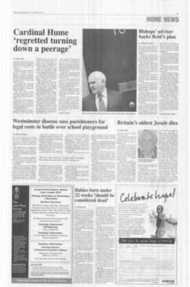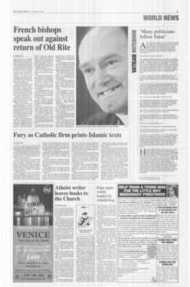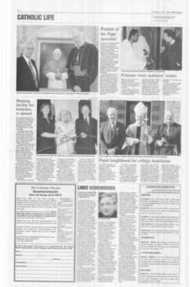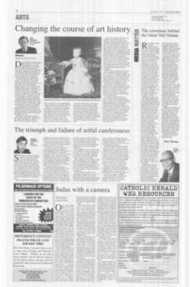Page 3, 27th October 2006
Page 3

Report an error
Noticed an error on this page?If you've noticed an error in this article please click here to report it.
Tags
Share
Related articles
Church Contemplates Cardinal's Cause
By Saptarshi Ray A Heartfelt Letter Of Support From The
Be True To Your Conscience And You Will Have No Regrets
Hume And Carey: Forgive Debt
2000 Ad: The Jubilee
Cardinal Hume 'regretted turning down a peerage'
BY FREDDY GRAY
CARDINAL BASIL. Hume may have regretted turning down repeated invitations to join the House of Lords, his successor has disclosed.
Speaking at a press conference to mark his Jubilee year as a bishop, Cardinal Cormac Murphy-O'Connor said that, before his death in 1999, Cardinal Hume had questioned his decision to refuse a seat in the Upper Chamber.
"Towards the end of his life Cardinal Hume was wondering whether he should be in the House of Lords]," said Cardinal Murphy-O'Connor.
"We were often getting requests from members, especially-from Catholic lords, wanting bishops to join the House of Lords."
The present Archbishop of Westminster said: "[Cardinal Hume] said to me once that he would never go in just because he was Cardinal Hume and that as a special person he got it.
Cardinal Murphy-O'Connor added that the bishops of England and Wales were divided over whether to join the House of Lords. "Most of them would not want to be in the House of Lords," he said. "[But] there are sonic who think we should be."
"He said that if we go in, we ought to go in by right. In other words, the archbishops should go in by right, whoever they are."
Cardinal Hume refused offers to join the House of Lords from three different Prime Ministers: James Callaghan, Margaret Thatcher and Tony Blair.
Most commentators agree that Cardinal Hume was bound by Canon Law to refuse a seat in the Upper House. The Church does not allow its clergy to take part in the making of laws.
But Cardinal Hume's biographer, Anthony Howard, told The Catholic Herald: "The one offer he may have thought seriously about is the one from Tony Blair."
Mr Howard explained that Mr Blair had offered to make him a Lord Spiritual, thus possibly bypassing the restrictions of canon law. "Blair said to him: 'Well, you wouldn't have to vote, you could just speak.' And that could be interpreted as not taking part in the making of laws." But, added Mr Howard, the idea was flawed, as Mr Blair did not have the constitutional authority to appoint Lords Spiritual. In order to appoint Cardinal Hume, the Prime Minister would have had to have passed an Act of Parliament first.
Mr Howard said that he did not think the Cardinal had felt deep regrets about refusing to join the Lords.
"It was never really on and Basil knew it," he said. "He was well out of it anyway, I don't think he would have liked being the only Catholic prelate in a secular House of Lords."
Cardinal Murphy-O-Connor said last week that he thought it "extremely doubtful" that Catholic bishops would soon join the Lords.
He said: "In Canon Law bishops aren't supposed to have a political role and I don't think Rome would go along with it. And I don't think our bishops on the whole would feel that it's to our advantage to be in the House of Lords. We can get our say in other ways."
Interview: Page 8
blog comments powered by Disqus

















